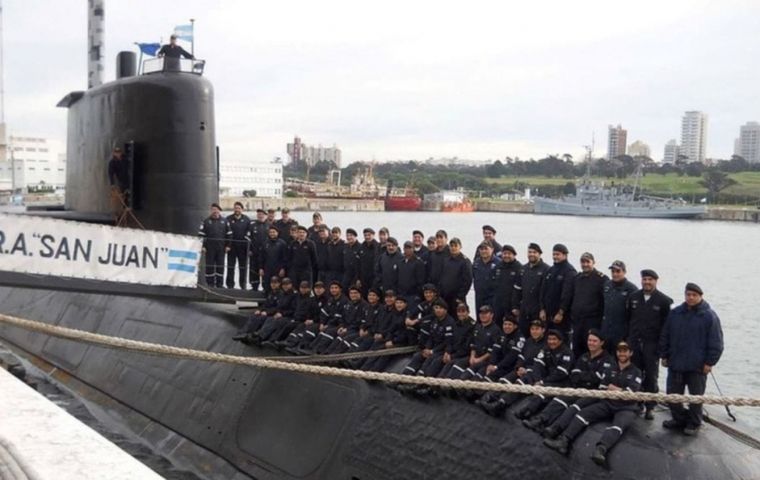MercoPress. South Atlantic News Agency
Macri summoned to account for espionage against relatives of lost submarine just ahead of Argentine mid-term elections
 The judge found there was no risk to the President's security to engage intelligence services, war veteran Judge Bava said
The judge found there was no risk to the President's security to engage intelligence services, war veteran Judge Bava said Former Argentine President Mauricio Macri has been summoned to appear on Oct. 7 before the Courts in a case of alleged espionage against relatives of the Navy's ARA San Juan submarine crew.
With Argentina's mid-term elections coming up, many analysts see some sort of lawfare in the timing of the ruling, although Macri himself is not a candidate.
Macri, currently in Miami, has also been banned from leaving the country by Judge Martín Bava, who is temporarily in charge of the Federal Court in the city of Dolores in the province of Buenos Aires.
It is the first time the former head of state needs to account for his doings in such a capacity. He is said to have engaged the Federal Intelligence Agency (AFI) to track down the movements of the relatives between late 2017 and December 2018.
The case had been filed by AFI head Cristina Caamano, who claimed that operatives had been asked to determine which actions the relatives were possibly planning against Macri. The judicial proceedings, first filed in Mar del Plata, shifted to Dolores following a procedural mistake from the Prosecution, judicial analysts have explained.
In a 166-page ruling, Judge Bava also provided for the indictment of former AFI directors Gustavo Arribas and Silvia Majdalani. Other then-AFI officials are under investigation “for the crime of carrying out prohibited intelligence actions as co-authors, by having obtained information, produced intelligence and stored data on people, by the mere fact of their private actions, or political opinion, or of adhesion or belonging to the party, social, union or community organizations, and for the legal activity that they developed, as well as by having tried to influence the institutional and political situation of the country, in the internal life of political parties and associations and legal groupings of any kind; in ideal competition with the crime of abuse of authority of a public official as co-authors.”
The Judge who issued that decision was an Army conscript soldier during the 1982 South Atlantic armed conflict with the United Kingdom over the Falklands / Malvinas Islands. He graduated as a lawyer from the University of Buenos Aires in 1991 and became a federal magistrate in the city of Azul after a dubious selection process.
He is currently in charge of the Dolores Court as well after Judge Alejo Ramos Padilla vacated that seat to take over the First Federal Court in the provincial capital La Plata, which is also entrusted with electoral jurisdiction and therefore carries a different political weight.
There are several open cases regarding alleged illegal espionage during the Macri administration.
Macri “was not going to be able to get away because the papers they presented, which are in the dossier, delivered by the spies, are addressed personally to him, he cannot” invoke lack of awareness, said lawyer Luis Tagliapietra, father of one of the deceased crew members.
The San Juan went missing on Nov. 15, 2017, in the South Atlantic with a crew of 44 onboard. She was found a year and two days later at the bottom of the sea by a private company not far from where it was supposed to be, at a depth of 907 m.
Former President and current VicePresident Cristina Fernández de Kirchner (CFK) Friday also denounced the JxC opposition was advancing towards seeking Macri's “impunity” through reforms to the judicial system in the Autonomous City of Buenos Aires (CABA).
Macri also has several active criminal cases against him for alleged events from before he became President.
“The highest positions in the Federal Intelligence Agency –in the investigated period– were those who carried out the planning, organization and distribution of the information illegally produced by the Mar del Plata Delegation; which reached the top of the National Executive Power,” Judge Bava wrote.
“Macri met for the first time with the families of the ARA San Juan crew members on November 20, 2017; that is to say, only five days after the disappearance of submarine 64,“ when “the espionage exercised against the relatives of the ARA San Juan crew members began,” he went on.
Judge Bava also downplayed “presidential security” grounds for the AFI's tracking of the wife and sister of two of the missing crew members who had met with Macri. ”What threat to internal security or presidential security can two women in a property guarded by various police and/or military forces suppose that all they wanted was to have a few minutes of the attention of the highest authority of the Republic at that time?” Bava argued.
“Upholding the idea that risk factors for internal security or national defence can be found in events of this type, takes us back to unacceptable times before the recovery of democracy, in which similar espionage tasks were carried out,” the judge went on.
The AFI reports addressed to the President of the Nation sought to report “on the legitimate claims that relatives of the victims of the disappearance of the submarine ARA San Juan were going to make; nothing is further from the legality and the functions of the AFI,” Bava also said.
The magistrate insisted those actions were explicitly in contradiction with Law 25,520 and its amendments regarding “storing data on people for their political opinion or their membership in partisan, social, union, community and Human Rights organizations.”




Top Comments
Disclaimer & comment rulesCommenting for this story is now closed.
If you have a Facebook account, become a fan and comment on our Facebook Page!